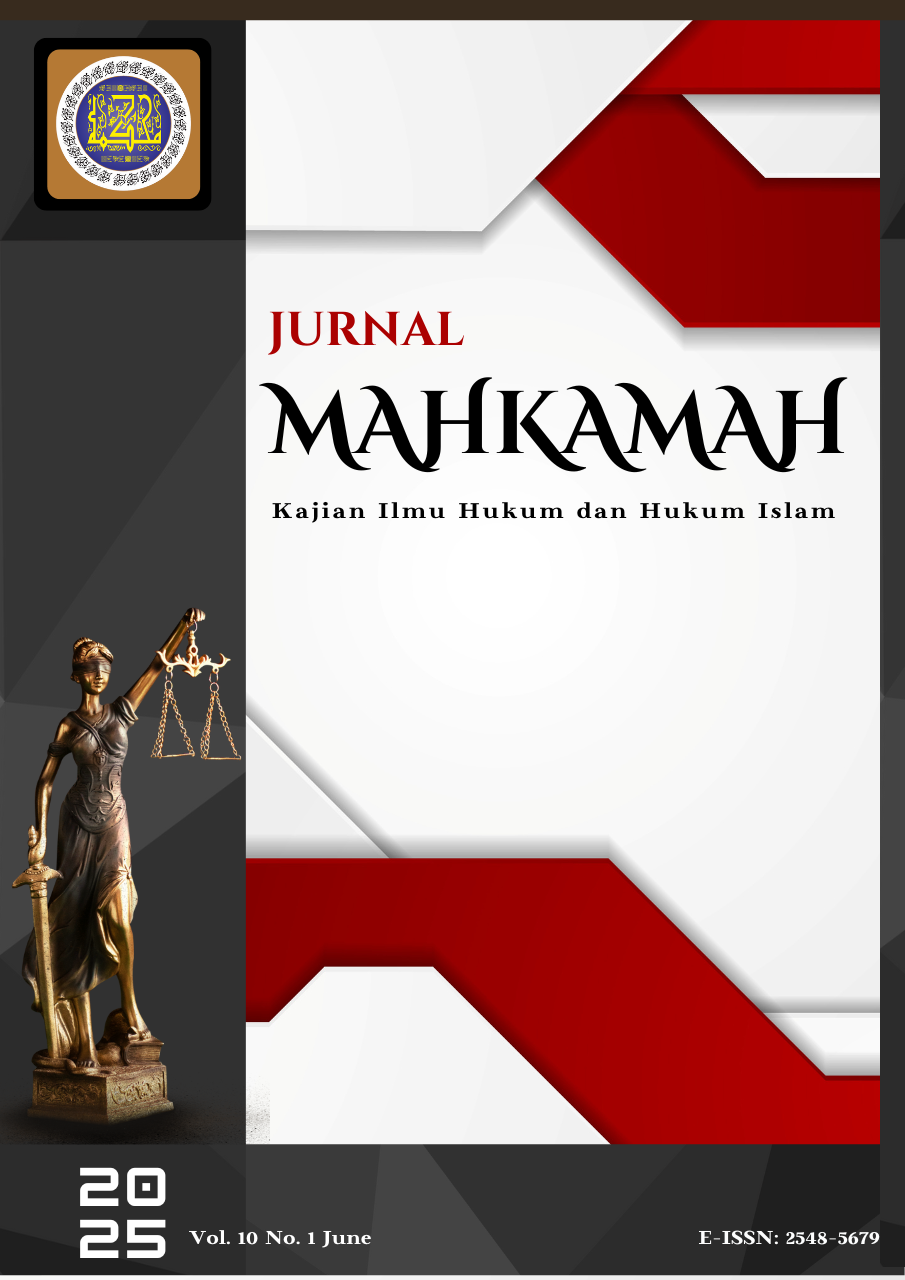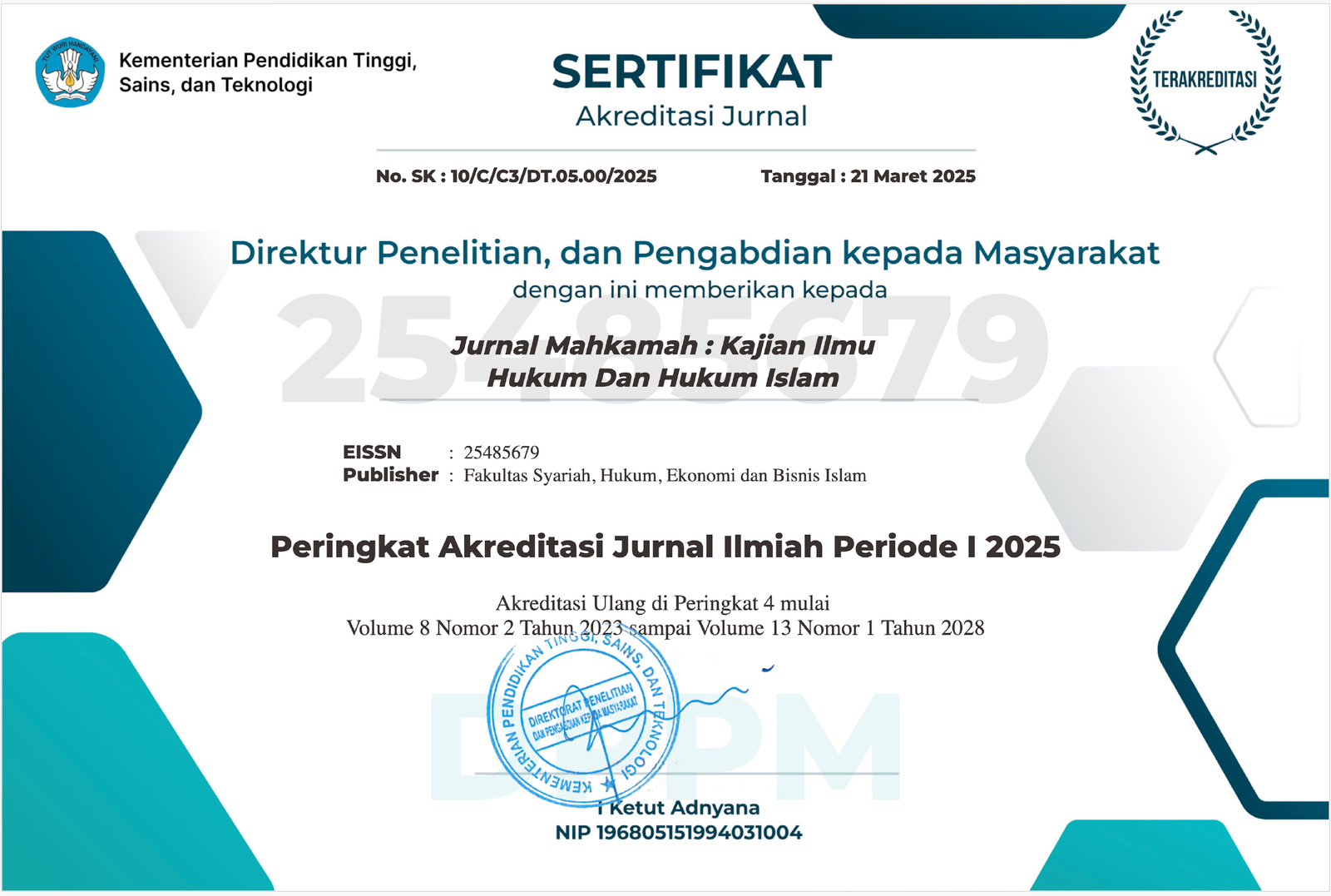Tajdid Nikah: Legal Analysis, Ulama Perspectives, and Maslahah Mursalah (A Case Study in East Lampung Regency)
DOI:
https://doi.org/10.25217/jm.v10i1.5855Keywords:
Tajdid Nikah; Legalization of Marriage; Maslahah MursalahAbstract
This study examines the phenomenon of tajdid nikah (renewal of the marriage contract) among Muslim couples in Giriklopomulyo Village, Sekampung District, East Lampung Regency, with a focus on cases involving pregnancy prior to the official marriage. Although both Islamic law and the Compilation of Islamic Law (KHI) Article 53 confirm that such marriages are valid without requiring re-contracting, tajdid nikah remains prevalent due to societal pressure, cultural norms, and insufficient legal literacy. Using a qualitative case study approach with data from interviews, documentation, and field observations, this research systematically analyzes five key dimensions: the definition of tajdid nikah, local chronology of its practice, its legal interpretation under KHI, contemporary ulama perspectives, and its relevance within the framework of maslahah mursalah. The findings show that tajdid nikah is often pursued not for legal necessity but to achieve psychological relief, family acceptance, and perceived social legitimacy. While some scholars tolerate the practice as a form of precaution (ihtiyat), most ulama assert that it is unnecessary if the first marriage contract was valid. In terms of maslahah mursalah, tajdid nikah can be viewed as beneficial when it reduces stigma and promotes harmony but may be harmful if it reinforces public misconceptions about Islamic legal norms. Therefore, tajdid nikah should not be institutionalized as a religious obligation, and broader legal education is needed to align community practices with sharia principles and Indonesian legal standards.
References
Agustina, A. M., & Ismah, N. (2024). Challenging Traditional Islamic Authority: Indonesian
Female Ulama and the Fatwa Against Forced Marriages. Journal of Islamic Law, 5(1), Article 1. https://doi.org/10.24260/jil.v5i1.2319
Ananda, A. R. C. (2021). Tajdid Nikah Sebagai Sarana Legalitas Perkawinan (Studi Peran Kantor Urusan Agama Kecamatan Moyo Utara Kabupaten Sumbawa Dalam Praktik Tajdid Nikah) [PhD Thesis, Uin Sunan Kalijaga Yogyakarta]. https://digilib.uinsuka.ac.id/id/eprint/46730/
Anggraini, N. A., Hidayat, M. F., Rijalussoleh, M., Zain, Z. A., & Lubis, R. (2025). Mediasi Sebagai Alternatif Penyelesaian Sengketa Hak Asuh Anak Dalam Hukum Keluarga Islam (Studi Kasus Di Simbawaringin Kec. Trimurjo Kab. Lampung Tengah). Bulletin of Islamic Law, 2(1), Article 1.
Apriliani, & Tjempaka, T. (2025). The Position of Daughters in Batak Customary Inheritance Law from the Perspective of Islamic Law. Jurnal Mahkamah : Kajian Ilmu Hukum Dan Hukum Islam, 10(1), 1–10. https://doi.org/10.25217/jm.v10i1.5927
AR. (2025). Wawancara dengan Petugas KUA Kecamatan Sekampung. [Personal communication].
Arifin, H., Sadiyah, C. U., Zahra, A. A., Setiawan, G., & Ismail, H. (2025). Efektivitas Mediasi Dalam Penyelesaian Sengketa Perceraian Di Pengadilan Agama: Perspektif Hukum Keluarga Islam (Studi Kasus Di Kota Metro). Bulletin of Islamic Law, 2(1), 43–54.
Asiyah, N., & Ghofur, A. (2017). Kontribusi Metode Maṣlaḥah Mursalah Imam Malik Terhadap Pengembangan Hukum Ekonomi Syari’ah Kontemporer. Al-Ahkam, 27(1), Article 1. https://doi.org/10.21580/ahkam.2017.27.1.1349
Asnawi, H. S., & Ismail, H. (2020). Discrimination against Wife in the Perspective of CEDAW and Islam Mubādalah. Ijtihad: Jurnal Wacana Hukum Islam Dan Kemanusiaan, 20(2), 253–268.
Asnawi, H. S., Shi, S. H., Nawawi, M. A., & Shi, M. A. (2022). Dinamika hukum perkawinan di Indonesia: Tinjauan hukum keluarga Islam terhadap legalitas perkawinan kepercayaan penghayat. Bildung.
https://digilib.unisayogya.ac.id/7061/1/Buku%20Referensi%20-
%20Dinamika%20Hukum%20Perkawinan%20di%20Indonesia.pdf
Atamy, W. F. (2023). Fenomena Tajdid Nikah Perspektif Hukum Positif di indonesia. TASHWIR, 11(02), 85–104.
Awaludin, W., Purnomo, A., & Maulidia, R. (2024). Konstruksi Sosial Suami Istri tentang Tajdid Nikah. Journal of Economics, Law, and Humanities, 3(2), 121–129.
Bambang, S. (2009). Metodologi Penelitian Hukum. Rajawali Pers.
http://katalogdiarpuskutaikartanegara.perpusnas.go.id/detail-opac?id=10439
Gunawan, I. (2022). Metode Penelitian Kualitatif: Teori dan Praktik. Bumi Aksara.
Hanafi, M. Y., & Safrudin, A. H. (2020). Analisis Hukum Islam terhadap Tradisi Tajdid AlNikah di Desa Kampungbaru Kecamatan Kepung Kabupaten Kediri. Salimiya: Jurnal Studi Ilmu Keagamaan Islam, 1(2), 212–229.
HS. (2025). Wawancara dengan suami yang melakukan tajdid nikah. [Personal communication].
Idris Ramulyo, M. (1999). Hukum perkawinan Islam: Suatu pengantar analisis dari UndangUndang nomor 1 tahun 1974 dan kompilasi hukum Islam (Ed. 2, cet. 2). Bumi Aksara.
Ismail, H., & Ja’far, A. K. (2024). Status Hukum Pernikahan Saudara Tiri Perspektif Hukum Keluarga Islam. Kartika: Jurnal Studi Keislaman, 4(2), 227–238.
KY. (2025). Wawancara dengan Tokoh Agama Setempat. [Personal communication].
M. Sahibuddin, M. S. (2020). Pandangan Fuqha’ Terhadap Tajdid An-Nikah (Sebuah Ekplorasi Terhadap Fenomena Tajdid an-Nikah DI Desa Toket Kec. Proppo Kab. Pamekasan). AlUlum : Jurnal Penelitian dan Pemikiran Ke Islaman, 5(2), 76–83. https://doi.org/10.31102/alulum.5.2.2018.76-83
Sahibuddin, M. S. M. (2018). Pandangan Fuqha’Terhadap Tajdid An-Nikah (Sebuah Ekplorasi Terhadap Fenomena Tajdid an-Nikah DI Desa Toket Kec. Proppo Kab. Pamekasan). AlUlum Jurnal Pemikiran Dan Penelitian Ke Islaman, 5(2), 76–83.
Sholehudin, M., Fadli, M., Sulistyarini, R., & Djumikasih, D. (2025). Cancellation of Marriage Due to Apostasy in Islamic Law and Human Rights: A Comparative Analysis of Indonesia and Malaysia. De Jure: Jurnal Hukum Dan Syar’iah, 17(1), Article 1. https://doi.org/10.18860/j-fsh.v17i1.31465
Surur, N. (2022). Tinjauan Maslahah Mursalah Terhadap Tajdid Nikah Pasutri Beda Agama: Studi Kantor Biro Taaruf Syar’i Kabupaten Sukoharjo. Al-Ahkam: Jurnal Ilmu Syari’ah Dan Hukum, 7(1), 113–122.
Tersiana, A. (2018). Metode Penelitian. Anak Hebat Indonesia.
Tony D. Susanto. (2020, August 30). Metode Penelitian STUDI KASUS (Case Study).
https://notes.its.ac.id/tonydwisusanto/2020/08/30/metode-penelitian-studi-kasus-casestudy/
Zein, N. A. (2018). Tajdid Nikah Pada Pasangan Muallaf (Analisis Perspektif Al-Istishab)
[PhD Thesis, UIN Ar-Raniry Banda Aceh]. https://repository.arraniry.ac.id/id/eprint/5786/
Downloads
Published
How to Cite
Issue
Section
License
Copyright (c) 2025 Nur Isti Fadah, Hud Leo Perkasa Maki; Hendra Irawan; Nency Dela Oktora, Husain Fadhil Arrasyid

This work is licensed under a Creative Commons Attribution-ShareAlike 4.0 International License.
This work is licensed under a Creative Commons Attribution-ShareAlike 4.0 International License.
Authors retain copyright and grant the Jurnal Mahkamah : Kajian Ilmu Hukum Dan Hukum Islam right of first publication with the work simultaneously licensed under a Creative Commons Attribution License (CC BY-SA 4.0) that allows others to share (copy and redistribute the material in any medium or format) and adapt (remix, transform, and build upon the material) the work for any purpose, even commercially with an acknowledgment of the work's authorship and initial publication in Jurnal Mahkamah : Kajian Ilmu Hukum Dan Hukum Islam.
Authors are able to enter into separate, additional contractual arrangements for the non-exclusive distribution of the journal's published version of the work (e.g., post it to an institutional repository or publish it in a book), with an acknowledgment of its initial publication in Jurnal Mahkamah : Kajian Ilmu Hukum Dan Hukum Islam.
Authors are permitted and encouraged to post their work online (e.g., in institutional repositories or on their website) prior to and during the submission process, as it can lead to productive exchanges, as well as earlier and greater citation of published work (See The Effect of Open Access).









